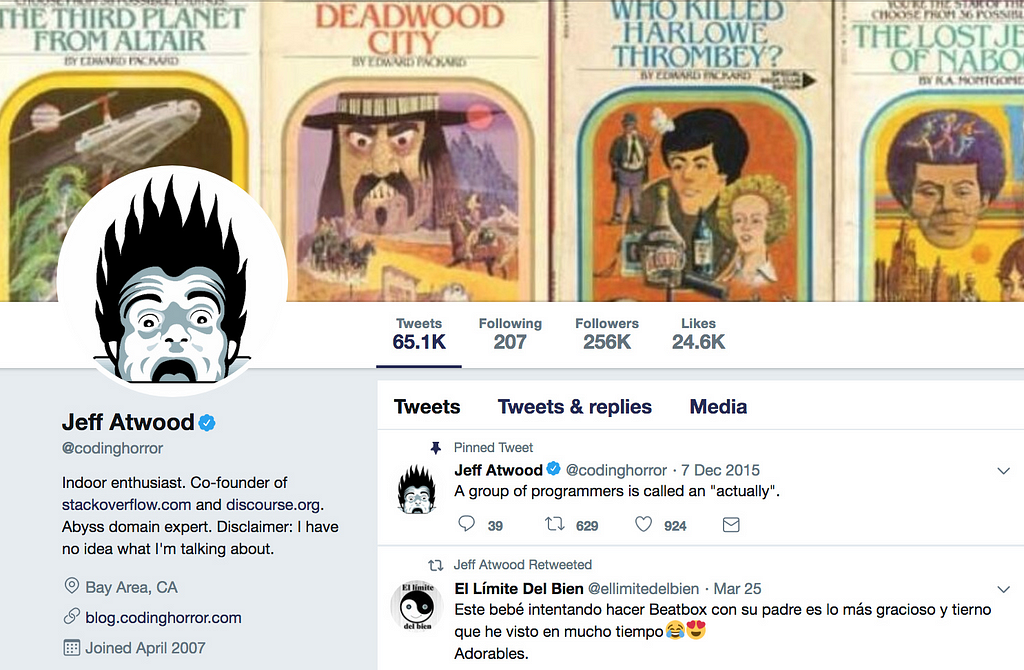Latest news about Bitcoin and all cryptocurrencies. Your daily crypto news habit.
Key Takeaways from Jeff Atwood’s AMA on Hacker Noon
Hacker Noon’s flagship section for tech discussions — community.hackernoon.com hosted an AMA (Ask Me Anything) session for Jeff Atwood. Jeff is the co-founder of Stack Overflow (later Stack Exchange), a life saver for developers and coders across the globe. He then started Discourse, the open source discussion software, in 2012. Full disclosure we’re fans because Discourse is powering Hacker Noon’s community forum and will be powering Hacker Noon’s commenting system. Good software.
The next Hacker Noon AMA is with with Indie Hacker’s Courtland Allen at Noon PST On Thursday 4/18
What I Learned From Jeff Atwood’s AMA
The community’s questions ranged from business development and technological innovations to community building and brand development exercises. The key takeaways from his AMA have been provided below. However, to check out his responses, in his characteristic style, and details to invoking Cthulhu, visit the AMA thread.
Programming, Technology, and Management
To a request for tips on building a software platform, Jeff maintains that even after his years of experience, no amount of planning and testing can help a software withstand actual use by the users. If you must optimize, focus on the speed of delivery of results:
“Thus the goal should be to get an early working version of your software in the hands of users, and have a tight and fast feedback loop to iterate on:
- deploy software
- gather feedback
- improve software based on that feedback
- repeat
Don’t optimize for getting everything right, that’s impossible, optimize for speed of improvement.”
Jeff argues that the best way to contribute to the open source movement is to participate. Find an open source project you enjoy or benefit from, and look at ways to contribute, starting with small stuff.
“Now that we’re profitable at Discourse, every year we do try to give back to the open source ecosystem that Discourse is a part of and benefits from.”
Jeff believes that you can ultimately accomplish more without coding if you are guiding many other coders towards a collective goal. The key is good communication skills and they make the difference between tolerable developers and great developers.
“Don’t start a really big project. Start a small project and iterate on it with your users to make it big.”
Writing, Blogging, and the Future of Content
Jeff says that social media platforms such as Facebook and Instagram have, in all probability, overrun the authority that blogs held back in the day. This leads to fewer people blogging and flocking to the other, more visual alternatives to blogging that do not require the level of skills and expertise that is required to blog:
“Fewer people blog regularly, and there’re a zillion alternatives to blogging, including pervasive social media.”
He advocates that the community moderators must have the ability to close the ‘community doors’ on the problematic members. If it is acceptable to do that in real life, why can’t we do that online? The best thing here is for people to write about the problems and publicize them widely. It works. The squeaky wheel gets the grease, especially if they have the higher moral ground of protecting underrepresented groups.
On Discourse, Jeff implements a trust system where those who have contributed responsibly and helpfully several times are awarded elevated privileges that help keep the trash out and create a roster of champions that uphold the quality on the platform.
Goals, Prioritization, and Preferences
We advise Discourse communities all the time on “how do I get famous” — there’s no getting around the central requirement of regularly creating great, interesting content that people enjoy.
“As an industry, we didn’t think enough about user safety and designing for evil. Part of it is that a lot of us are men, and people don’t bother us in the way that women and underrepresented groups tend to get bothered online — so we didn’t consider the many ways our software could be abused to make other people’s lives miserable. But the good news is that I believe software can be designed to encourage people to be their better selves online”
Jeff believes in the “Three Things” philosophy. It says that we must delete our fancy to-do lists and just focus on three things that we need to get done today. That’s all we need to do.
“When it comes to software, I generally practice complaint driven development, and for Discourse we always favor aggregate feedback from active communities over random opinions.”
Jeff accepts that both, Discourse and Slack can co-exist as they cater to different organizations. For a smaller team collaborating as a tight-knit group, Slack is better while Discourse takes the crown for larger companies where multiple threads need to co-exist and be easily searchable.
At the End of the Session
One thing about Jeff that stands out is his ability to find a humorous way of making his point. Throughout the AMA, he made it a point to recommend as many good books as possible. From the fifty-year-old classic, the 10 commandments of Egoless Programming to the more modern, Sapiens.
I’d like to thank Jeff for sharing his valuable time.
The next Hacker Noon AMA is with with Indie Hacker’s Courtland Allen at Noon PST On Thursday 4/18
Key Takeaways from Jeff Atwood’s AMA on Hackernoon was originally published in Hacker Noon on Medium, where people are continuing the conversation by highlighting and responding to this story.
Disclaimer
The views and opinions expressed in this article are solely those of the authors and do not reflect the views of Bitcoin Insider. Every investment and trading move involves risk - this is especially true for cryptocurrencies given their volatility. We strongly advise our readers to conduct their own research when making a decision.
